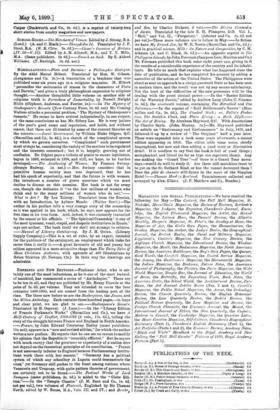REPRINTS A.ND NEW EDITIONS.—Profemor Arber, who is cer- tainly one
of the most industrious, as he is one of the most learned, of mankind, has commenced a series of "Anthologies." There are to be ten in all, and they are published by Mr. Henry Frowde at the price of 3s. 6d. per volume. They are intended to cover the four centuries 1400-1800, and are named from the leading poet of the time. The three now before us are the Shakespeare, the Janson, and the Milton Anthology. Each contains three hundred pages,—in large and clear print, we are glad to see.—Shakespeare's Sonnets. Illustrated by H. Ospovat. (J. Lane.)—In the "Library Edition of Francis Parkmau's Works" (Macmillan and Co.), we have A Half-Century of Conflict, 1700-1701 (2 vols., 178. 60.), telling the story of the struggle between France and England in North America. —France, by John Edward Courtenay Bodley (same publishers, 10s. net), appears in a "new and revised edition," for which the author writesa new preface. He regrets that he can see no reason to modify his opinion that the Republic is "incurably afflicted." But he argues with much energy that the greatness or superiority of a nation does not depend on the theoretical principles of its constitution. "France is not necessarily inferior to England because Parliamentary institu- tions work there with less success." "Germany has a political system of which any schoolboy in Laputa could demonstrate the vices," yet Germany still pushes to the front among nations, where Venezuela and Uruguay, with quite pattern theories of government, amsertainly not to be found.—The Poetical Works of Lord 2'enityson (same publishers, Ss. 6d.) is added to the "Globe RAJ- tion,"—In the "Temple Classics" (J. M. Dent and Co., Is: 60. net per vol.), two volumes of Plutarch, Englished by Sir. Thomas North, edited by W. Rouse, MA., Vols. III. and IV.; and Dombey and Son, by Charles Dickens, 3 vols.—The Dirina Commedia of Dante. Translated by the late E. H. Plumptre, D.D. Vol. I, "Hell," and Vol. II., "Purgatory." (Isbister and Co. 2s. 6d. net per vol.)—Three more volumes are to follow in May.—In fiction we have My Friend Jim, by W. E. Norris (Macmillan and Co., 6d.) ; and in practical science, Milk : its Nature and Composition, by C. M. Aikraan (A. and C. Black, 3s. 6d.)—An apposite reprint is The Philippine Islands, by John Foreman (Sampson Low, Marston and Co.) Mr. Foreman published this book some eight years ago, giving in it the results of a considerable experience of the country and its inhabi- tants. He tells us much that explains what has happened since the date of ipublication, and he has completed his account by adding a narrative of the action of the United States. The Philippines were about as near an approach to a clergy-governed State as has been seen in modern times, and the result was not by any means satisfactory. Not the least of the difficulties of the new possessors will be the dealing with the great clerical power.—In the "Border Edition of the Waverley Novels," edited by Andrew Lang (John (I. Nimmo, 38. 60.), the nineteenth volume, containing The Betrothed and The Talisnian.—In the reprint of "Rolf Boldrewood's Novels" (Mac- millan and Co., 3s. 6d.), The Crooked Stick; or, Pollie's Proba- tion, The Sealskin Cloak, and Plain Living : a Bush Idyll.— The Art of Dining. By Abraham Hayward, Q.C. With Annotations by Charles Sayle. (John Murray. 5s.)—Mr. Hayward published an article on "Gastronomy and Gastronomers" in July, 1835, and followed it up by a review of "The Original" half a year later. These were expanded into a book some years afterwards, a second edition appearing in 1853. The editot adds some notes, chiefly biographical, but now and then adding a good story or illustrative detail. It is needless to say that the book is full of good things ; metaphorical, and literal (as far as type can represent them). Any one making the "Grand Tour "—if there is a Grand Tour nowa- days—would do well to study it. Are there still matchless trout to be got on the St. Gothard Road, or has the tunnel destroyed them ? Does the pato de chamois still figure in the menu of the Simplon Hotel 2—Thomas Hood in Scotland. Reminiscences collected and arranged by Alex. Elliott. (J. P. Matthew and Co., Dundee.)






































 Previous page
Previous page